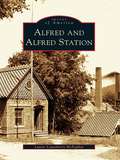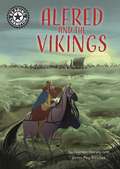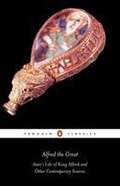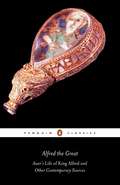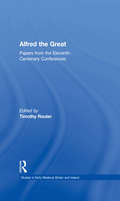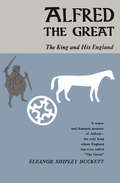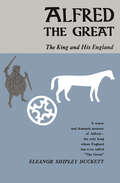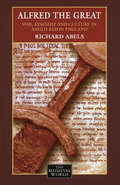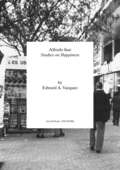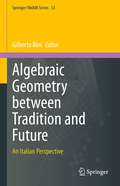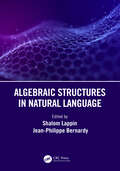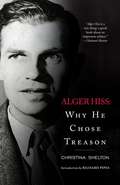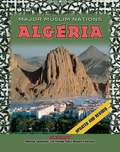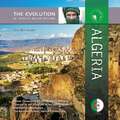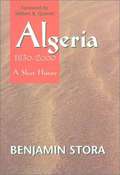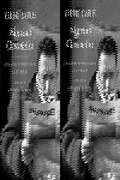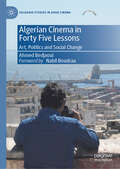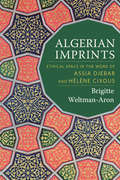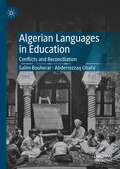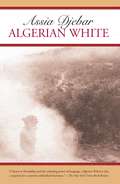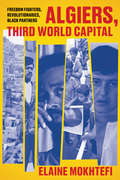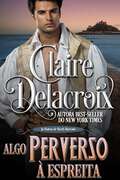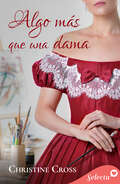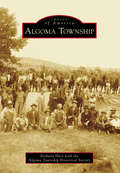- Table View
- List View
Alfred and Alfred Station
by Laurie Lounsberry McfaddenAlfred and Alfred Station reveals the heritage of a southwestern New York State community nestled in the hills of Allegany County. With more than 200 pictures, the story honors the early pioneers who in 1807 permanently settled on forested land once inhabited by the Seneca Nation. It focuses on not only education--always highly valued, as evidenced in the three institutions of higher learning here--but also on the people, businesses, farms, and civic organizations that have enriched the town for 200 years.
Alfred and the Vikings: Independent Reading 18 (Reading Champion #455)
by Damian HarveyWhen Vikings arrive and invade, King Alfred summons the Anglo-Saxons to fight. This true story of the famous defeat of the Vikings is brought to life through the eyes of Alfred's squire, who witnesses Alfred's bravery first hand.This first colour chapter book is a perfectly levelled, accessible text for Key stage 2 readers aged 10-11 or in year 6. Reading Champion offers independent reading books for children to practise and reinforce their developing reading skills.Fantastic, original stories are accompanied by engaging artwork and activities to provoke deeper response and encourage writing. Each book has been carefully graded so that it can be matched to a child's reading ability, encouraging reading for pleasure.The Key Stage 2 Reading Champion Books are suggested for use as follows:Independent Reading 11: start of Year 3 or age 7+Independent Reading 12: end of Year 3 or age 7+Independent Reading 13: start of Year 4 or age 8+Independent Reading 14: end of Year 4 or age 8+Independent Reading 15: start of Year 5 or age 9+Independent Reading 16: end of Year 5 or age 9+Independent Reading 17: start of Year 6 or age 10+Independent Reading 18: end of Year 6 or age 10+
Alfred the Great: Asser's Life of King Alfred and Other Contemporary Sources
by Anonymous Simon KeynesThe socialist ideals of the early twentieth century argued for a radical overhaul of architectural philosophy, reasserting the value of public space and redefining all forms of creative endeavor towards the benefit of the collective. These ideals were realized in the design of public buildings, streets and squares, as well as in films, literature and the visual arts. Urban planning under Eastern European Socialism is consequently inseparable from its ideological aspirations, and while its governmental structure may have collapsed, its architectural expressions remain. Over the last decade, however, many classic buildings of this era have been stripped of their political import, being repurposed or even destroyed. The Post Socialist City reveals that many cities across Eastern Europe remain dominated by the industrial complexes and panel buildings erected by Socialism, and analyzes the implications of the uses to which they have subsequently been put.
Alfred the Great: Asser's Life of King Alfred and Other Contemporary Sources
by AsserAsser's Life of King Alfred, written in 893, is a revealing account of one of the greatest of medieval kings. Composed by a monk of St David's in Wales who became Bishop of Sherborne in Alfred's service and worked with him in his efforts to revive religion and learning in his kingdom, this life is among the earliest surviving royal biographies. It is an admiring account of King Alfred's life, written in absorbing detail - chronicling his battles against Viking invaders and his struggle to increase the strength and knowledge of his people, and to unite his people at a time of conflict, uncertainty and war.
Alfred the Great: Papers from the Eleventh-Centenary Conferences (Studies in Early Medieval Britain and Ireland #3)
by Timothy Reuter1999 marked the eleven-hundredth anniversary of the death of Alfred the Great, and to mark this event, two international conferences were held to re-evaluate and contextualise Alfred's achievements and the developments of his reign. This volume includes papers given at both events and provides substantial assessments, by leading scholars, of issues of source-criticism, of the large corpus of Old English literature associated with Alfred and of developments in government and society in late ninth-century England. It also explores how Alfred and his kingdom related to the wider geo-political and cultural situation in the British isles and continental Europe, and closes with a substantial survey of the uses and shifts in Alfred's reputation in the centuries following his death. This substantial and wide ranging volume will become a standard reference work for anyone interested in Old English literature or Anglo-Saxon history, and will set the pattern of future scholarly debate.
Alfred the Great: The King and His England
by Eleanor Shipley DuckettFilled with drama and action, here is the story of the ninth-century life and times of Alfred--warrior, conqueror, lawmaker, scholar, and the only king whom England has ever called "The Great." Based on up-to-date information on ninth-century history, geography, philosophy, literature, and social life, it vividly presents exciting views of Alfred in every stage of his long career and leaves the reader with a sharply-etched picture of the world of the Middle Ages.
Alfred the Great: The King and His England (Phoenix Books)
by Eleanor Shipley DuckettFrom the author of The Gateway to the Middle Ages, &“a fascinating portrait of an enlightened monarch against a background of darkness and ignorance&” (Kirkus Reviews). Filled with drama and action, here is the story of the ninth-century life and times of Alfred—warrior, conqueror, lawmaker, scholar, and the only king whom England has ever called &“The Great.&” Based on up-to-date information on ninth-century history, geography, philosophy, literature, and social life, it vividly presents exciting views of Alfred in every stage of his long career and leaves the reader with a sharply etched picture of the world of the Middle Ages.
Alfred the Great: War, Kingship and Culture in Anglo-Saxon England (The Medieval World)
by Richard AbelsThis biography of Alfred the Great, king of the West Saxons (871-899), combines a sensitive reading of the primary sources with a careful evaluation of the most recent scholarly research on the history and archaeology of ninth-century England. Alfred emerges from the pages of this biography as a great warlord, an effective and inventive ruler, and a passionate scholar whose piety and intellectual curiosity led him to sponsor a cultural and spiritual renaissance. Alfred's victories on the battlefield and his sweeping administrative innovations not only preserved his native Wessex from viking conquest, but began the process of political consolidation that would culminate in the creation of the kingdom of England. Alfred the Great: War, Kingship and Culture in Anglo-Saxon England strips away the varnish of later interpretations to recover the historical Alfredpragmatic, generous, brutal, pious, scholarly within the context of his own age.
Alfredo Jaar: Studies on Happiness (Afterall Books / One Work)
by Edward A. VazquezA richly illustrated survey of Alfredo Jaar&’s Studies on Happiness (1979–1981) and its deep political stakes in the historical context of Chile&’s neoliberal transition.Between 1979 and 1981, Alfredo Jaar asked Chileans a deceptively simple question: "Are you happy?" Through private interviews, sidewalk polls and video-recorded forums, among other interventions, Jaar&’s three-year and seven-phase project, Studies on Happiness, addressed a furtive and fearful population living under Augusto Pinochet&’s military dictatorship. It also spoke to a country in transition, as a newly adopted constitution remade Chile through privatisation and other neoliberal reforms. In its varied interventions and direct mode of address, Studies on Happiness functioned as a feedback device meant to catalyse a critical awareness with its blunt questioning.Edward A. Vazquez contextualises Studies on Happiness within Jaar&’s early production and situates his practice within a Chilean art world haunted by the residues of political violence. This study foregrounds the project&’s historical embeddedness and the deep political stakes of its apparent sociality, recognising the crucial role that context has always played in Jaar&’s practice. By turning to the Santiago of Studies on Happiness, Vazquez explores the work&’s political and art historical environment and provides a wedge to realign current interpretations of Chilean art and hemispheric conceptualism with the openness central to Jaar&’s project.
Algebraic Geometry between Tradition and Future: An Italian Perspective (Springer INdAM Series #53)
by Gilberto BiniAn incredible season for algebraic geometry flourished in Italy between 1860, when Luigi Cremona was assigned the chair of Geometria Superiore in Bologna, and 1959, when Francesco Severi published the last volume of the treatise on algebraic systems over a surface and an algebraic variety. This century-long season has had a prominent influence on the evolution of complex algebraic geometry - both at the national and international levels - and still inspires modern research in the area. "Algebraic geometry in Italy between tradition and future" is a collection of contributions aiming at presenting some of these powerful ideas and their connection to contemporary and, if possible, future developments, such as Cremonian transformations, birational classification of high-dimensional varieties starting from Gino Fano, the life and works of Guido Castelnuovo, Francesco Severi's mathematical library, etc. The presentation is enriched by the viewpoint of various researchers of the history of mathematics, who describe the cultural milieu and tell about the bios of some of the most famous mathematicians of those times.
Algebraic Structures in Natural Language
by Jean-Philippe BernardyAlgebraic Structures in Natural Language addresses a central problem in cognitive science concerning the learning procedures through which humans acquire and represent natural language. Until recently algebraic systems have dominated the study of natural language in formal and computational linguistics, AI, and the psychology of language, with linguistic knowledge seen as encoded in formal grammars, model theories, proof theories and other rule-driven devices. Recent work on deep learning has produced an increasingly powerful set of general learning mechanisms which do not apply rule-based algebraic models of representation. The success of deep learning in NLP has led some researchers to question the role of algebraic models in the study of human language acquisition and linguistic representation. Psychologists and cognitive scientists have also been exploring explanations of language evolution and language acquisition that rely on probabilistic methods, social interaction and information theory, rather than on formal models of grammar induction. This book addresses the learning procedures through which humans acquire natural language, and the way in which they represent its properties. It brings together leading researchers from computational linguistics, psychology, behavioral science and mathematical linguistics to consider the significance of non-algebraic methods for the study of natural language. The text represents a wide spectrum of views, from the claim that algebraic systems are largely irrelevant to the contrary position that non-algebraic learning methods are engineering devices for efficiently identifying the patterns that underlying grammars and semantic models generate for natural language input. There are interesting and important perspectives that fall at intermediate points between these opposing approaches, and they may combine elements of both. It will appeal to researchers and advanced students in each of these fields, as well as to anyone who wants to learn more about the relationship between computational models and natural language.
Alger Hiss: Why He Chose Treason
by Christina SheltonIn 1948, former U.S. State Department official Alger Hiss was accused of being a Soviet spy. Because the statute of limitations on espionage had run out, he was convicted only of perjury. Decades later--after the Hiss trial had been long forgotten by most--archival evidence surfaced confirming the accusations: a public servant with access to classified documents had indeed passed crucial information to the Soviets for more than a decade. Yet many on the American Left still consider Hiss an iconic figure--an innocent victim accused of unsubstantiated crimes. They prefer to focus on the collectivist ideals Hiss stood for, rather than confront the reality of a man who systematically and methodically betrayed his country. Former U.S. Intelligence analyst Christina Shelton employs an in-depth knowledge of Soviet intelligence affairs as well as recently released Hungarian and KGB archival material to shine a fresh light on one of the most famous espionage cases. The story is dramatic, but Shelton's analysis goes beyond sensationalism as she explores both the ideological motivation behind Hiss's behavior and the lasting influence it has had on U.S. foreign policy. Why exactly were the intellectual elite so deter-mined that Hiss was innocent? His accuser, Time magazine senior editor Whittaker Chambers--originally Hiss's Soviet handler--presented compelling written evidence. However, the intelligentsia were intent on supporting one of their own. They ignored the facts, a willful blindness that helped contribute to a polarization still in place in our country today. Thirty years of intelligence analysis gives Shelton the expertise to approach the story from many different angles, especially: * Her persuasive argument that Communism and Fascism are not polar opposites, as has so long been claimed, but highly similar ideologies. * How Hiss's central role at the Yalta Conference and the founding of the United Nations are examples of the significance of Soviet intelligence recruitment of high-level Americans who could influence U.S. foreign policy in their favor. * Why the silence surrounding the implications of Hiss's espionage continues--and why apologists fear that smearing his name would undercut New Deal policies and the United Nations. Shelton doesn't just detail the body of evidence pointing to Hiss's guilt; she suggests new layers of meaning in light of the current political landscape. Today, the importance of understanding Hiss's ideological commitment has never been more vital. His advocacy of collectivism and internationalism still resonate among the political elite, making this book an important and timely analysis of American thought at this critical juncture in our country's life.
Algeria
by James MorrowAlgeria is a large country with a fascinating past and a troubled present. The nation was devastated by years of fighting between government forces and Islamic extremists. The unrest that began in 1991 left tens of thousands dead and forced many others to flee their homes. Fighting has also broken out between the country's Arab and Berber populations. In addition, although this large North African nation has great resources, including a large share of the world's oil and natural gas reserves, today its people are quite poor by Western standards.In recent years the violence has slowed, and the Algerian government has attempted to improve the lives of its people. However, it remains to be seen whether the country will have a peaceful and productive future, or whether the internal divisions within Algeria will ultimately fragment the nation beyond repair.
Algeria (The Evolution of Africa's Major Nations)
by Daniel E. HarmonThe vast North African country of Algeria became independent in 1962 after a brutal eight-year-long war against France. Unfortunately, Algeria has not had a stable history, as various leaders have seized power through military coups. In 1991 a rising Islamist movement in the country led to a civil war that lasted for more than a decade and resulted in over 150,000 deaths. Algerians are still attempting to put the tragedies of the past behind them and rebuild their country. Algeria is fortunate to control many important resources, including vast reserves of oil and national gas. However, since 2011 there have been numerous protests against the government, with people demanding more jobs, better housing, and a more open and transparent political system. Much work must be done to ensure a peaceful and prosperous future for all Algerians.
Algeria, 1830-2000: A Short History
by Jane Marie Todd Benjamin StoraA particularly vicious and bloody civil war has racked Algeria for a decade. Amnesty International notes that since 1992, in a population of 28 million, 80,000 people have been reported killed, and the actual total is almost certainly higher. This terrible war overshadows Algeria's long and complex history and its prominence on the world economic stage—second in size among African nations, Algeria has the longest Mediterranean coastline and contains the world's fifth-largest natural gas reserves. Algeria, 1830-2000 is a comprehensive narrative history of the country. Benjamin Stora, widely recognized as the leading expert on Algeria, presents the story of this turbulent area from the start of formal French colonialism in the early nineteenth century, through the prolonged war for independence in the latter 1950s, to the internal strife of the present day. This book adapts and updates three short volumes published originally in French by La Découverte. For this English edition, Stora has written a new introductory chapter on Algeria's colonial period (1830-1954) and has revised the final section to bring the volume up to date.
Algerian Chronicles
by Albert CamusMore than 50 years after independence, Algerian Chronicles, with its prescient analysis of the dead end of terrorism, appears here in English for the first time. Published in France in 1958-the year the war caused the collapse of the Fourth French Republic-it is one of Albert Camus’ most political works: an exploration of his commitment to Algeria.
Algerian Cinema in Forty Five Lessons: Art, Politics and Social Change (Palgrave Studies in Arab Cinema)
by Ahmed BedjaouiAlgerian Cinema in Forty Five Lessons offers a fresh approach to examine the history of Algerian cinema, from its inception to the present day, providing in-depth analysis of forty five key films. While most scholarly and critical work on Algerian cinema continues to centre on the War of Independence and those films engaging with it, Dr Ahmed Bedjaoui argues that this thematic dominance has overshadowed many other important aspects of Algerian film history. Further, Bedjaoui examines how "revolutionary" films have frequently depicted an idealized image of a heroic, flawless and fearless figure which has been strategically crafted to legitimize national authority at different points in time. This book offers a new reading, which involves rehabilitating some major but underestimated works, as well as questioning other films primarily known for their contribution to the Algerian national story. Among the works studied, certain productions offer a less Manichean vision of the War of Independence, while explaining the process that led to it. Above all, Bedjaoui strives to bring out of the shadows films of great artistic value (sometimes produced by state television), and compares the productions of the so-called golden age (1960s and 1970s) with the films made by the following generations, in terms of both creativity and capacity to reflect the specificity of Algerian society. Through a contextualization of forty specific films, this book provides a deep analysis of the changes which occurred in the heart of Algerian society, moving from an all-socialist to an all-protectionist state, before being later threatened by religious fundamentalism. Engaging and accessibly written, and including coverage of many films never written about in English-language histories of Algerian cinema, this book is an essential resource for understanding this dynamic and vital film culture.
Algerian Imprints: Ethical Space in the Work of Assia Djebar and Hélène Cixous
by Brigitte Weltman-AronBorn and raised in French Algeria, Assia Djebar and Hélène Cixous represent in their literary works signs of conflict and enmity, drawing on discordant histories so as to reappraise the political on the very basis of dissensus.In a rare comparison of these authors' writings, Algerian Imprints shows how Cixous and Djebar consistently reclaim for ethical and political purposes the demarcations and dislocations emphasized in their fictions. <P><P>Their works affirm the chance for thinking afforded by marginalization and exclusion and delineate political ways of preserving a space for difference informed by expropriation and nonbelonging. Cixous's inquiry is steeped in her formative encounter with the grudging integration of the Jews in French Algeria, while Djebar's narratives concern the colonial separation of "French" and "Arab," self and other. Yet both authors elaborate strategies to address inequality and injustice without resorting to tropes of victimization, challenging and transforming the understanding of the history and legacy of colonized space.
Algerian Languages in Education: Conflicts and Reconciliation
by Salim Bouherar Abderrezzaq GhafsiThis book examines the role of foreign languages and cultures in the Algerian educational system, highlighting how cultural imperialism and supremacy persist through damaging language ideologies and the privileging of colonial languages such as French and English. The authors challenge the claim that the Algerian educational system can be considered ‘neutral’, arguing instead that it was and still is the outcome of a conflict between Arabised and Francophone elites, serving strategic and ideological objectives rather than cultural or pedagogical goals. This book will be relevant to students and scholars of language education, language policy and planning, and the history and politics of the Arab and Muslim world, especially those interested in the influence of Western languages and cultures and the democratisation of educational systems.
Algerian White: A Narrative
by Assia Djebar Marjolijn De Jager David KelleyIn Algerian White, Assia Djebar weaves a tapestry of the epic and bloody ongoing struggle in her country between Islamic fundamentalism and the post-colonial civil society. Many Algerian writers and intellectuals have died tragically and violently since the 1956 struggle for independence. They include three beloved friends of Djebar: Mahfoud Boucebi, a psychiatrist; M'Hamed Boukhobza, a sociologist; and Abdelkader Alloula, a dramatist; as well as Albert Camus. In Algerian White, Djebar finds a way to meld the personal and the political by describing in intimate detail the final days and hours of these and other Algerian men and women, many of whom were murdered merely because they were teachers, or writers, or students. Yet, for Djebar, they cannot be silenced. They continue to tell stories, smile, and endure through her defiant pen. Both fiction and memoir, Algerian White describes with unerring accuracy the lives and deaths of those whose contributions were cut short, and then probes even deeper into the meaning of friendship through imagined conversations and ghostly visitations.
Algiers, Third World Capital: Freedom Fighters, Revolutionaries, Black Panthers
by Elaine MokhtefiA fascinating portrait of life with the Black Panthers in Algiers: a story of liberation and radical politicsFollowing the Algerian war for independence and the defeat of France in 1962, Algiers became the liberation capital of the Third World. Elaine Mokhtefi, a young American woman immersed in the struggle and working with leaders of the Algerian Revolution, found a home here. A journalist and translator, she lived among guerrillas, revolutionaries, exiles, and visionaries, witnessing historical political formations and present at the filming of The Battle of Algiers.Mokhtefi crossed paths with some of the era’s brightest stars: Frantz Fanon, Stokely Carmichael, Timothy Leary, Ahmed Ben Bella, Jomo Kenyatta, and Eldridge Cleaver. She was instrumental in the establishment of the International Section of the Black Panther Party in Algiers and close at hand as the group became involved in intrigue, murder, and international hijackings. She traveled with the Panthers and organized Cleaver’s clandestine departure for France. Algiers, Third World Capital is an unforgettable story of an era of passion and promise.
Algo Perverso à Espreita (As Noivas de North Barrows #1)
by Claire DelacroixSete anos atrás, Sophia Brisbane perdeu tudo: seu pai, seu irmão, a fortuna da família, mas pior, foi rejeitada pelo homem que amava. Ela está determinada a não ansiar pelo passado, nem por seus prazeres, até encontrar Lucien de Roye outra vez. Embora ele soubesse que Sophia jamais poderia ser dele, Lucien jurou recuperar a herança desperdiçada dela. Mesmo que através de um acordo com um demônio, em que ele cede a própria alma. Quando Sophia descobre o que ele fez, nenhuma força no céu ou na terra vai convencê-la a deixá-lo pagar o que deve ao demônio, não importa o custo para si.
Algo más que una dama (Familia Marston #Volumen 1)
by Christine CrossEn la sociedad londinense de la época georgiana, de la hija de un duque solo podía esperarse que fuese una gran dama. ¿Pueden romperse las reglas por una gran pasión? ¿Y si esa pasión conlleva un asesinato? Lady Arabella Marston se encuentra ya en su tercera temporada y sigue soltera y sin compromiso, aunque no le importa demasiado. Su verdadera pasión es la pintura. Dispuesta a demostrar que puede ser algo más que una dama, decide presentar su obra, La ninfa del agua, a la primera exposición de verano que tendrá lugar en la Real Academia de Artes de Londres. Cuando Arabella descubra que le han robado el cuadro, no tendrá más remedio que pedir su ayuda al conde Alexander Harvey, Lord Thornway; un hombre apuesto y recién llegado de Europa, al que no dudará en catalogar como libertino. Sin embargo, pronto descubrirá que su superficialidad esconde un corazón atormentado por el pasado. La atracción que siente por él, hará que surjan en Arabella muchas dudas. ¿Deberá renunciar a sus sueños y a su pasión por la pintura para escoger el amor? Solo cuando alguien intente acabar con su vida, comprenderá qué es lo esencial para su corazón.
Algo más que una dama (Familia Marston #Volumen 1)
by Christine CrossEn la sociedad londinense de la época georgiana, de la hija de un duque solo podía esperarse que fuese una gran dama. ¿Pueden romperse las reglas por una gran pasión? ¿Y si esa pasión conlleva un asesinato? Lady Arabella Marston se encuentra ya en su tercera temporada y sigue soltera y sin compromiso, aunque no le importa demasiado. Su verdadera pasión es la pintura. Dispuesta a demostrar que puede ser algo más que una dama, decide presentar su obra, La ninfa del agua, a la primera exposición de verano que tendrá lugar en la Real Academia de Artes de Londres. Cuando Arabella descubra que le han robado el cuadro, no tendrá más remedio que pedir su ayuda al conde Alexander Harvey, Lord Thornway; un hombre apuesto y recién llegado de Europa, al que no dudará en catalogar como libertino. Sin embargo, pronto descubrirá que su superficialidad esconde un corazón atormentado por el pasado. La atracción que siente por él, hará que surjan en Arabella muchas dudas. ¿Deberá renunciar a sus sueños y a su pasión por la pintura para escoger el amor? Solo cuando alguien intente acabar con su vida, comprenderá qué es lo esencial para su corazón. En los blogs...«Una novela fascinante que combina un buen romance histórico con una trama donde la intriga y el peligro no dejan de sorprender al lector. La autora me ha llevado a disfrutar con la historia, me ha permitido conocer a personajes carismáticos y me ha sumergido en una deliciosa obra, primera de su serie "Marston".»Blog Promesas de amor
Algoma Township
by Algoma Township Historical Society Bethany HartAlgoma Township was established by the Michigan Legislature on March 15, 1849, and named in honor of the steamer Algoma, which ran a route on the nearby Grand River in 1848. The township's earliest settlers included the Lapham, Davis, Helsel, Morningstar, and Porter families, among others. Early residents logged and farmed the area's land; today, these traditions continue. The Powell and Bowler farms are just two local examples of Centennial Farms (farms that have been owned and operated by the same family for more than 100 years). Other groups--including the Algoma Grange No. 751, United Brethren Church, and small rural schools--helped to establish a community in Algoma even without it having an independent town center. As a result, Algoma grew beyond its humble beginnings and Native American name that translates to "fields of wild roses." The treasured stories and images presented in this collection aim to highlight Algoma Township's development and the hardworking people who call the township home.
